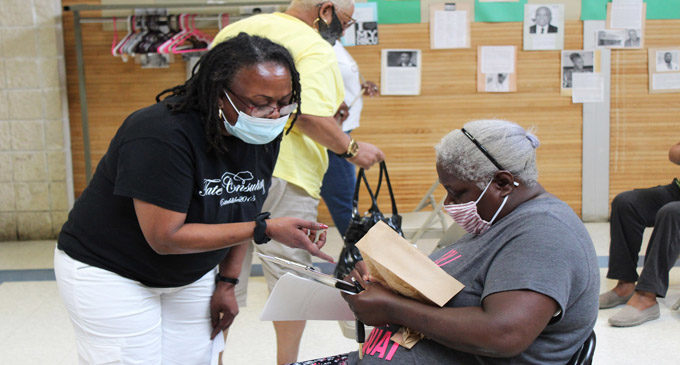CSEM brings research help to East Winston initiative to empower residents
Kimberlee McNeil, standing, the president of the Castle Heights Neighborhood Association, talks with a resident at a recent meeting.

By John Railey
The Castle Heights Neighborhood Association, which has long worked for better conditions for its residents, is stepping up its game through a collaboration with the poverty-fighting Partnership for Prosperity (P4P). The initiative has tapped Winston-Salem State University’s Center for the Study of Economic Mobility (CSEM) as its research partner.
“The neighborhood association has made an excellent choice in selecting CSEM as their data analyst,” said Paula McCoy, the director of the P4P. “The work that CSEM is doing around social mobility aligns perfectly with P4P’s mission. We are excited about this collaborative place-based approach and look forward to replicating it throughout the community.”
CSEM Associate Director Alvin Atkinson said, “We are always excited about an opportunity to obtain local, neighborhood data as it enables us to gain new knowledge about the views and perspectives of individuals who sometimes feel that their voice or opinion doesn’t matter. Oft times, this research becomes a catalyst for helping them see that their voice does matter and can empower them in ways that they had not experienced before.”
The initiative will work with residents, neighborhood leaders and service providers to resolve difficulties low-resource communities face. CSEM Research Manager Zach Blizard has designed a survey to help residents identify the needs they want addressed. There is another key CSEM connection: Kimberlee McNeil, the president of the Castle Heights Neighborhood Association, is a graduate of the Ne3w Leadership Academy, a CSEM-supported effort that trains community leaders.
McNeil said the neighborhood is poised for the opportunities the initiative will bring. “We’ve worked hard over the years, and we’ll be happy to see some of the fruits of our labor through this collaborative approach,” she said.
McCoy has said of McNeil: “Kimberlee has grown as a leader and has a wealth of knowledge to contribute to the development of her neighborhood and to the greater community as a whole,” McCoy said. “She has incredible potential to help change the status quo.”
CSEM has long combined research with community engagement, so the new initiative is a natural fit. It will utilize “study circles.”
McCoy said, “Study circles are a bottoms-up approach to decision-making and problem solving where residents are the experts in matters that directly impact them.” Residents will have a voice in matters where they will discuss how the issue affects them, what others are saying about the issue, to a session on action. “We hope these study circles result in a ‘collective impact’ – engagement of large numbers of grassroots and grass top leaders – that produce a shared vision, implementable solutions and public awareness of poverty.”
The initiative, McCoy said, “will allow us to work collaboratively with neighborhoods utilizing the assets that already exist there to strengthen the physical, social, structural and economic conditions of the community that affect the well-being of the children, families and individuals who live there. It also allows us to work collaboratively with service providers, helping to ‘connect the dots’ to the five social determinants of health (housing, education, jobs and workforce development, food insecurity and health and wellness).”
The community action plan will be led by the residents and supported by collaborative partners and service providers. Funding partners include the City of Winston-Salem, the Twin City Development Foundation, and The Winston Salem Foundation.
The initiative in Castle Heights will be a pilot program that could lead to more study circles.
“The success of ‘study circles,’” says McCoy, “depends not only on the full engagement of residents most impacted by the social determinants of health, but is also dependent on the cooperation and collaboration of (community-based) organizations, associations and agencies.”
Collaborators in the effort include Neighbors for Better Neighborhoods, Place Matters, Hope 2 Thrive, The Forsyth Promise, Wake Forest Office of Civic and Community Engagement, and The Village Pledge.
John Railey (raileyjb@gmail.com) is the writer-in-residence for CSEM, www.wssu.edu/csem.









